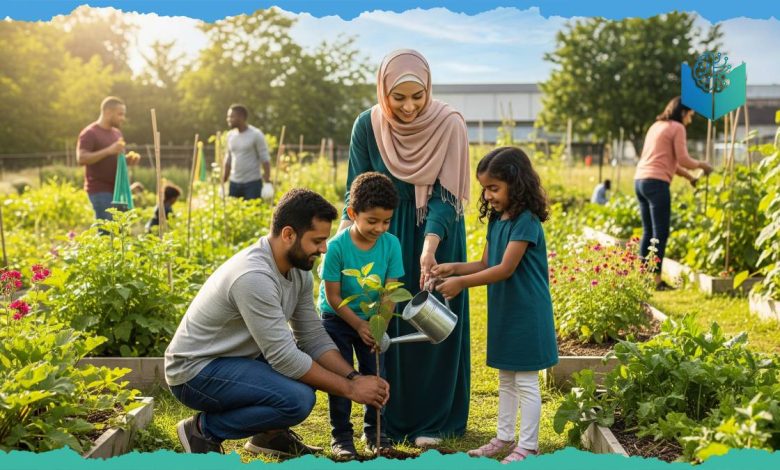Islam and Environmental Responsibility

The relationship between Islam and Environmental Responsibility is deeply rooted in the Quran. Long before global conversations on climate change and sustainability began, Islam taught responsibility toward nature and all living beings. Caring for the earth is not just a moral choice but an act of worship. When we revisit the Quran, we see clear guidance on stewardship, balance, and gratitude for the natural world.
Islam and Environment: A Divine Trust
The environment is not ours to exploit freely; it is a trust from Allah. The Quran reminds us that everything in creation has a purpose:
“Indeed, all things We created with predestination.” (Quran 54:49)
This verse shows us that balance is part of divine wisdom. Understanding Islam and Environmental Responsibility means recognizing that humans are caretakers, not owners, of the planet.
Environmental Responsibility in Islam
The Quran calls on believers to live with justice and moderation. This includes how we treat natural resources. Wasting, polluting, or abusing creation goes against the very principles of faith. When we learn about Islam , it becomes clear that wastefulness and neglect of resources are against Quranic teachings.
“Indeed, the wasteful are brothers of the devils, and ever has Satan been to his Lord ungrateful.” (Quran 17:27)
This verse teaches a direct lesson: protecting resources is part of environmental responsibility in Islam. Whether it’s water, energy, or food, sustainability starts with avoiding waste.

Green Islam: A Way of Life
Some people speak of “Green Islam” as if it were something new. In reality, environmental care has always been part of the Islamic way of life. From planting trees to conserving water, the Prophet ﷺ encouraged actions that reflect harmony with nature.
The Quran points to nature as a sign of God’s greatness:
“And it is He who produces gardens trellised and untrellised, and date palms, and crops of different shape and taste…” (Quran 6:141)
Here, Allah not only describes diversity in creation but also warns us not to waste what we harvest. A truly green lifestyle in Islam means mindful consumption and gratitude.
Quranic Teachings on Nature
When we study Quranic teachings on nature, we find that the natural world is more than just a resource. It is a living classroom, filled with signs that lead us back to our Creator.
“Indeed, in the creation of the heavens and the earth, and the alternation of the night and the day, are signs for those of understanding.” (Quran 3:190)
This verse encourages reflection. Every sunrise, every tree, and every drop of rain is a reminder of divine wisdom. Protecting nature, therefore, is not just about survival but about honoring these signs.
Islamic Sustainability: A Balance for All
The concept of Islamic sustainability is about balance — between human needs and environmental health. The Quran teaches moderation in all things:
“And establish weight in justice and do not make deficient the balance.” (Quran 55:9)
This balance applies to ecosystems, economies, and daily life. Sustainability in Islam is not only ecological but spiritual. When we live moderately, we protect both the earth and our souls from corruption.
Practical Lessons from Islam and Environment
So how do these teachings apply today? Islam’s guidance is practical and timeless. Let’s look at some everyday lessons.

Conserving Water
The Prophet ﷺ used minimal water even when performing ablution. This practice reflects the Quran’s warning against waste. Water is life, and respecting it is part of environmental responsibility in Islam.
Planting Trees and Caring for Animals
Planting a tree is considered an ongoing charity (sadaqah jariyah). Feeding animals is rewarded, while cruelty to them is condemned. These small acts connect us to Green Islam.
Avoiding Corruption on Earth
The Quran warns:
“And do not commit abuse on the earth, spreading corruption.” (Quran 2:60)
Pollution, overconsumption, and deforestation all fall under this warning. Islam frames them not just as environmental issues but as moral failings.
Quranic Teachings on Nature and Modern Challenges
The world today faces climate change, deforestation, and pollution. But the Quran already guided us toward solutions. It teaches reflection, moderation, and stewardship.
“And do not walk upon the earth exultantly. Indeed, you will never tear the earth [apart], and you will never reach the mountains in height.” (Quran 17:37)
This verse reminds us to live humbly, not arrogantly, toward creation. Quranic teachings on nature directly challenge the greed and pride that drive environmental destruction.
Islamic Sustainability and Future Generations
When we speak of Islamic sustainability, it is not only about our lives but about leaving a healthier planet for those who come after us. The Quran reminds us of this trust:
“And He it is who has made you successors upon the earth…” (Quran 6:165)
Being successors means inheriting responsibility. Our choices today will shape the environment tomorrow. This perspective gives Muslims a strong motivation to engage in sustainable living.

Islam and Environment in Daily Life
Understanding Islam and environment should inspire us to live greener lives in small but powerful ways:
- Reducing waste at home.
- Recycling and reusing resources.
- Using energy responsibly.
- Supporting eco-friendly community projects.
Each of these actions becomes a form of worship when done with the intention of protecting Allah’s creation.
Conclusion
The Quran calls us to reflect, protect, and live in balance with the world around us. Islam and environment are to concepts very related to each other. From conserving water to planting trees, from respecting animals to avoiding waste, environmental responsibility in Islam is a natural extension of faith. What people call Green Islam today is, in fact, the original way of living taught in the Quran. By following Quranic teachings on nature and embracing Islamic sustainability, Muslims can play a leading role in creating a greener planet.
To explore more on how Islam guides us in caring for creation, visit ayaat.ai.
Q&A
What does Islam say about the environment?
Islam teaches that the environment is a trust from Allah, and humans are caretakers responsible for protecting it. The Quran emphasizes balance, avoiding waste, and respecting all of creation.
Is Islam eco-friendly?
Islam is deeply eco-friendly, teaching that the Earth is a trust from Allah and must be protected. The Quran calls for balance, avoiding waste, and living responsibly with nature.
How does Islam view nature?
Islam views nature as a sign of Allah’s greatness, filled with lessons that guide humans to faith. The Quran teaches that caring for creation is both a duty and an act of worship.





